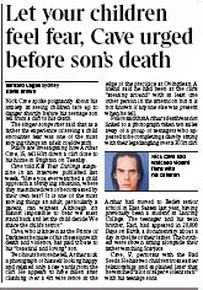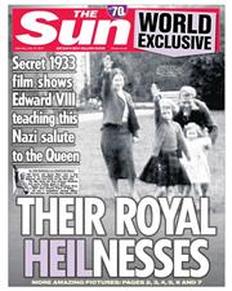The Times carried this follow up to the sad news of Arthur Cave's death on page 19 on Friday. It is based on an interview with an Australian literary magazine called Kill Your Darlings in which he said:
Have you ever watched a child approach a terrifying situation, where they must face down or be consumed by their own fear? It is one of the most moving things an adult, particularly a parent, can witness. Although it's almost impossible to bear, we must stand back and let the child decide. We share the child's terror.
Next, let's consider what Cave is saying. That you have to let your children go, even though your heart may be in your mouth. And to do so, to watch them tackle a difficult situation, is a moving experience for a parent. That is not the same as encouraging them to be reckless or foolhardy.
So many people took exception to this story that the Times has removed it from its website.
But is it not relevant - and even in the public interest - to have Nick Cave's recent thoughts on this subject, since the interview was published only the week before his son's death?
Where the story falls down is not in reporting his words about watching a child's terror, but in the bits that go round that quote; the assertion that Cave is known as the Prince of Darkness "because of his obsession with death and violence".
Umm... I may be wrong here, but I believe Cave is known as the Prince of Darkness because his work often deals with death and violence (Murder Ballads is a brilliant album). That doesn't mean that he is personally obsessed with them. The aforementioned Stephen King has written at least two dozen terrifying books, does that make him personaly obsessed with horror?
Further suggestions of bad parenting come with the disclosure that a documentary showed him watching Scarface (hardly the most terrifying film) with Arthur and his twin brother Earl and that he had once said - we aren't told when - that he had watched "a lot of super-violent stuff with his teenage sons".
Well, isn't that much better parenting - to sit alongside them and discuss - than to leave them in their bedrooms watching who knows what?
The story also points out that police were saying that they were not linking the boy's death with a photograph of teenagers sitting with their legs dangling over a 300ft cliff ten miles away - a link the Mail was swift to make in its initial report of Arthur's fall. (The paper had given over page 3 to the earlier photograph the previous day.)
The problem with the Times story was not in the fact that it was written, but in the way it was written, and I think it's a shame that the editorial team weren't brave enough to re-edit and leave it up online.
And so to the royal "Nazi salute". Should the Sun have published its still from an 80-year-old film? Of course it should. Why not?
No one is going to think any better or worse of the Queen - or any differently about her mother and uncle - because of this, but it is a valid piece of history. No, we don't know the context, but we can be pretty sure (a) that the little Princess wasn't being taught to show allegience to the new German Chancellor and (b) that she hadn't the faintest idea of the significance of the gesture.
So if Her Majesty (not HRH as the Mirror's tortuous head calls her) is livid, she is not the woman we've come to think of her as being. She may be dismayed, but she'll get over it.
What is far more disappointing is the Express's desperation in declaring "She was waving" and the Independent on Sunday's leader saying that it wouldn't have published. The Indie has since its inception avoided royal stories, so we'd have expected it not to have gone for the story. But not out of misplaced delicacy.
As journalists we should often be more sensitive than we are. But there is no reason to be censorious about either of these Murdoch stories.
And the Sun's heading was inspired.




 RSS Feed
RSS Feed


